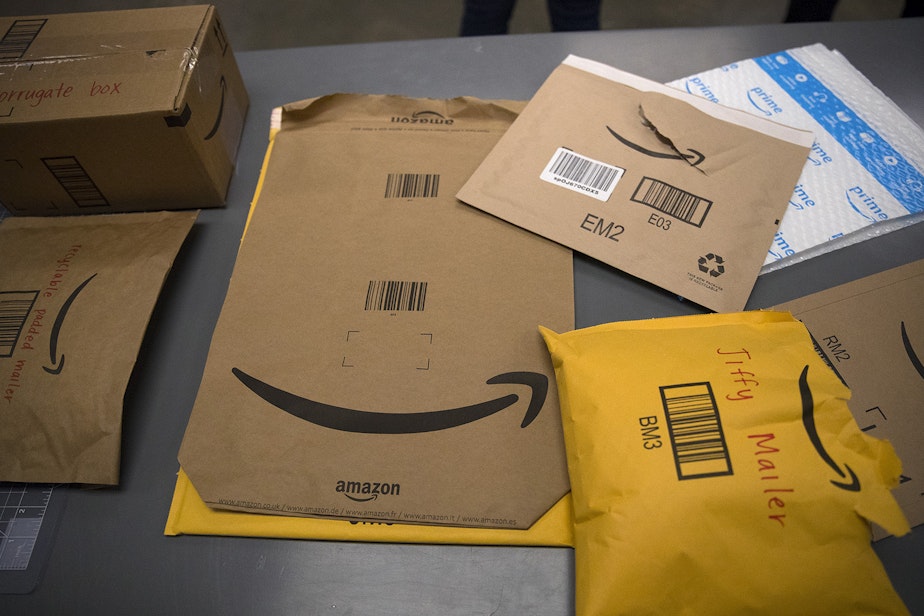Regulators say Amazon obstructed investigations into warehouse safety violations

Washington state officials say Amazon has stonewalled workplace safety inspectors by attempting to prevent them from entering the company's warehouse facilities.
This comes after state officials this spring filed a citation against Amazon, saying the company was violating the law with its pace of work and creating a hazardous environment for workers. Katherine Long, a Seattle-based senior tech reporter for Business Insider, joined KUOW’s Paige Browning to explain the latest.
In the fall of 2020, the investigative news outlet Reveal published a story showing that injuries at Amazon warehouses are more than twice the industry average.
These are injuries like back sprains and carpal tunnel syndrome, repetitive stress injuries that come from workers doing the same thing over and over again at what some workers say are relentlessly high speeds. At some warehouses, including one warehouse in DuPont, Washington, workers get injured even more often on average.
DuPont is home to the most dangerous large Amazon warehouse in the United States, where workers get injured on average six times more often than workers in non-Amazon warehouses. State officials started investigating the DuPont warehouse soon after the Reveal story was published last year, and their findings were groundbreaking in scope.
They found that the pace of work at Amazon's warehouses and the lack of a standardized ergonomics program was violating the law and creating hazardous working conditions for Amazon workers. Amazon has appealed that citation, but if it is upheld, it could force Amazon to fundamentally change how it operates its warehouses.
What we know from a court filing from earlier this month is that state workplace safety inspectors say that ever since they issued this citation to Amazon, the company has been attempting to obstruct inspectors’ efforts to monitor safety in other Amazon warehouses. This filing was actually a request for a warrant. It would force Amazon to allow inspectors to enter warehouses, and would force Amazon to turn over some information that workplace safety inspectors were looking for.
Sponsored
The reason that this warrant was necessary is that inspectors say Amazon has been trying to stonewall their efforts to make sure that the warehouses are being operated in a manner that's safe for employees.
Inspectors said that Amazon has on two occasions attempted to bar them from entering warehouses. They said that Amazon has instructed employees that they don't need to comply with the inspection. One inspector said that when she was monitoring some workers, Amazon would repeatedly tell those workers that they should leave, that they should go on break. or go do training elsewhere so that the inspector wasn't able to monitor them.
The company is refusing to give inspectors access to data, and Amazon is also objecting to the use of some wearable technology that would monitor how often employees are exposed to ergonomic risks.
A judge granted inspectors’ request for a warrant, meaning that inspectors do have more unfettered access to Amazon's warehouses, but we don't really know the extent to which Amazon has changed how it’s operating its warehouse in DuPont, where inspectors issued that groundbreaking citation earlier this year.
The company has asked the state to request that it not be required to abate the situation that inspectors found was damaging workers' health and safety. The state denied that request. So, in theory, Amazon is needing to reform how workers are treated and how fast they're expected to move at this warehouse, but we don't have any hard details about what is actually happening.
Sponsored
Amazon told me that it disagrees with inspectors' claims that it had obstructed their access to facilities. It said that it is complying with the inspections. Other than that, I haven't gotten much out of the company.
I'm most curious to see how Amazon abates the workplace hazards at its DuPont warehouse. I think that that could potentially give some clues as to how it might change warehouses nationwide if this citation is upheld.
Listen to the interview by clicking the play button above and read Katherine Long's full story for Business Insider here.





